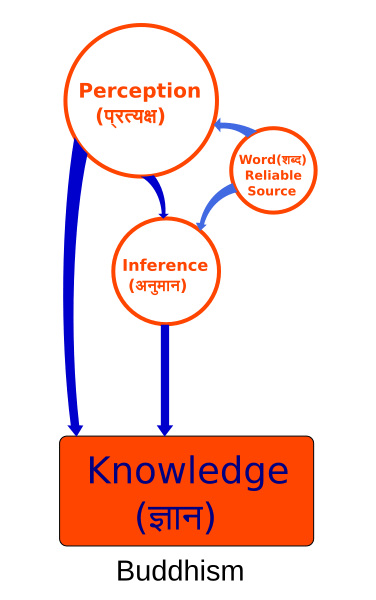Image: 2 Pramana Epistemology Buddhism

Description: The ancient and medieval Indian schools of philosophy call epistemology as Pramanas. Different schools consider different number of epistemic means to correct knowledge, between one of Charvaka school to six of Advaita Vedanta: Pratyakṣa (perception), Anumāṇa (inference), Upamāṇa (comparison and analogy), Arthāpatti (postulation, derivation from circumstances), Anupalabdi (non-perception, negative/cognitive proof) and Śabda (word, testimony of past or present reliable experts). To verify the interconnection and maps above: [1] Jeaneane Fowler (2002), Perspectives of Reality: An Introduction to the Philosophy of Hinduism, Sussex Academic Press, ISBN 978-1898723943, page 134-146; [2] Karl Potter (2004), The Encyclopedia of Indian Philosophies: Indian metaphysics and epistemology, Volume 2, Motilal Banarsidass, ISBN 978-8120803091, pages 222-238; [3] John A Grimes (2006), A Concise Dictionary of Indian Philosophy, State University of New York Press, ISBN 978-0791430675, pages 237-240; [4] Lati Rinbochay and Elizabeth Napper (1981), Mind in Tibetan Buddhism, ISBN 978-0937938027, pages 115-119 (This file was tested on https://validator.w3.org/check on January 19 2016, with result: Passed, This document was successfully checked as SVG 1.1 + XHTML + MathML 3.0!)
Title: 2 Pramana Epistemology Buddhism
Credit: Own work
Author: Ms Sarah Welch
Usage Terms: Creative Commons Attribution-Share Alike 4.0
License: CC BY-SA 4.0
License Link: https://creativecommons.org/licenses/by-sa/4.0
Attribution Required?: Yes
Image usage
The following page links to this image:

